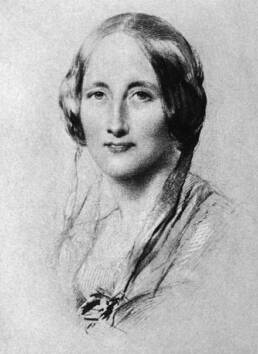These life stories may contain descriptions of childhood trauma and abuse, as well as images, voices and names of people now deceased. If you need help, you can find contact details for some relevant support services on our support page.
English writer, Elizabeth Gaskell (1810-1865), was in kinship care during her childhood.
Elizabeth Gaskell was born Elizabeth Cleghorn Stevenson in Chelsea, London, to Unitarian parents, Elizabeth Holland and William Stevenson.
Elizabeth Holland died in 1811 and baby Elizabeth was despatched to live with her mother’s older sister, Aunt Lumb, in Knutsford, Cheshire, about 16 km from Manchester.
Although it was not particularly unusual for a child to be raised by relatives other than her mother in the early nineteen century, young Elizabeth Stevenson felt the absence of maternal nurturance sharply and idealized the role of maternity throughout her life (D’Albertis).
William Stevenson remarried, but Elizabeth visited his father rarely and when she did, she became ‘very, very unhappy’.
Because Unitarians held progressive ideas about education for girls, Elizabeth was sent to a boarding school in Warwickshire where she began writing stories.
Elizabeth Stevenson met William Gaskell, a Unitarian minister based in Manchester, in 1831. The couple married the following year in Knutsford and then lived in Manchester. After their only son, 10-month-old William, died from scarlet fever in 1845, Gaskell began on her first novel, Mary Barton.
Mary Barton was a hit. Carlyle…approved and only the mill owners objected to the anonymous author’s depiction of the Lancashire working man’s hardships and superior nobility to those who exploited their labour and seduced their daughters. Gaskell’s identity was soon known and overnight she became a celebrity. Dickens, another admirer, invited her to contribute to his new weekly magazine, Household Words, and it was in its pages that Cranford…first appeared (Sutherland, 102).
Elizabeth Gaskell – who is generally known as Mrs. Gaskell – continued writing novels and short stories until her death at the age of 55. Her writing is valued for both its literary merit and its social history.
References:
Cavendish, Richard. “Birth of Mrs Gaskell.” History Today, September 1, 2010.
D’Albertis, Deirdre. “The life and letters of E. C. Gaskell.” The Cambridge Companion to Elizabeth Gaskell, edited by Jill Matus. Cambridge University Press, 2007.
Sutherland, John (2013) Lives of the Novelists. A history of fiction in 294 lives. London, UK: Profile Books.
